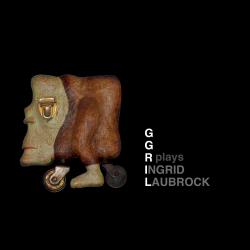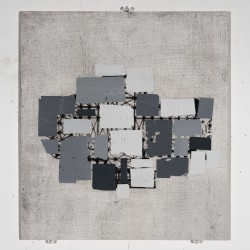 GGRIL Plays Ingrid Laubrock
GGRIL Plays Ingrid Laubrock
GGRIL; Ingrid Laubrock
Tour de Bras TDB900039 / Circumdisc microcidi015 (tourdebras.com ; www.circum-disc.com)
Le Rnst
Xavier Charles; Pierre-Yves Martell; Éric Normand; Matija Schellander
Ambiances Magnétiques AM254 CD (actuellecd.com)
Since 2003, Éric Normand has been building a unique musical empire, a thriving hub of free improvisation in the city of Rimouski on the Gaspé Peninsula. There he’s assembled an orchestra, created a record label and festival, and brought major figures to appear as guest soloists and conductors. He’s also managed to arrange performances for that orchestra, GGRIL, or Grande Groupe Régional d’Improvisation Libérée as far afield as Europe, building increasingly strong links.
The measure of Normand’s Rimouski achievement is apparent immediately on GGRIL Plays Laubrock, with the orchestra hosting German-born, New York-resident Ingrid Laubrock, a brilliant saxophonist and improviser whose work extends to conducting Ligeti’s Poème Symphonique for 100 metronomes and her own large ensemble pieces released as Contemporary Chaos Practices (Intakt). Here she leads a 16-member GGRIL in three pieces, covering a series of divergent methodologies.
It’s a heterodox ensemble mixing electric guitars and bass with winds, strings, a harp and assorted percussion; a lightly plucked cello can share space with droning feedback, but it’s a group in which sharp contrasts take on a unity of their own. The opening Silent Light is a graphic score with inserted conductions, moving between spacious textures and sudden forceful interludes, its delicately plucked strings merging with dense explosions and structural trumpet blasts. Laubrock’s tenor saxophone comes forcefully to the fore in its later moments. Strak Dark is composed, developing passages of muted electronics and pensive bowed strings, while the concluding Palindrome is a collective improvisation with set dynamic markings. The intense performance testifies both to the orchestra’s creative range and Laubrock’s inventiveness with minimalist structural inputs.
 Another side of Normand is evident in Le Rnst, a single 34-minute improvisation that combines two Quebecois musicians with two Europeans, Austrian Matija Schellander is playing an acoustic double bass, Normand is playing his homemade electric bass as well as objects and fellow Quebecer Pierre-Yves Martel is playing viola de gamba as well as harmonicas. French clarinetist Xavier Charles completes the group.
Another side of Normand is evident in Le Rnst, a single 34-minute improvisation that combines two Quebecois musicians with two Europeans, Austrian Matija Schellander is playing an acoustic double bass, Normand is playing his homemade electric bass as well as objects and fellow Quebecer Pierre-Yves Martel is playing viola de gamba as well as harmonicas. French clarinetist Xavier Charles completes the group.
Recorded in l’église Saint-Merry in Paris, the church’s resonance performs a major role in the performance, adding scale and a special depth, and highlighting a gradual and detailed interaction in which the instruments’ harmonics take on a life of their own. Charles is a great sonic explorer, summoning unknown avian species within the confines of his clarinet, even creating the illusion of an alto or even a bass version of the instrument. The various bass string players are similarly resourceful, sometimes functioning as electronic drones or hand drums, depending on an individual instrument’s characteristics, while an extended passage of spacious long tones manages even to blur their identities with Charles’ clarinet. It’s free improvisation of a rare, sustained and tranquil beauty.



